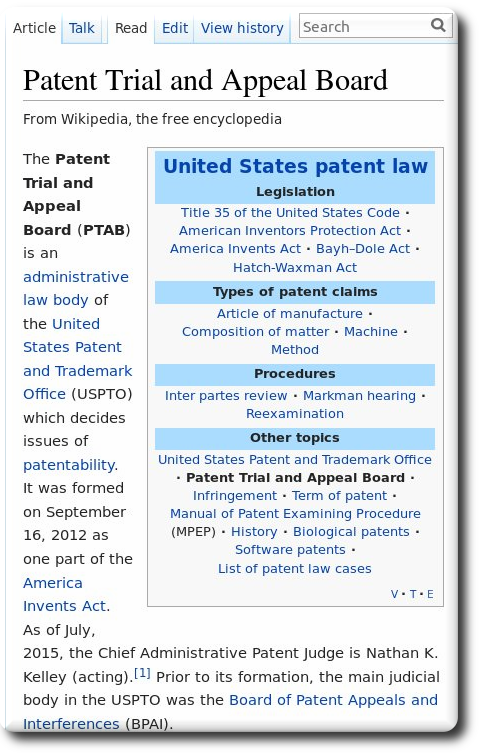

THERE are many patent myths abound. They are being spread by those who profit from patents, not from products. In fact, they rarely make anything at all (except destructive lawsuits). Among the myths is the concept that an economy with a lot of patents (even too many) will thrive. But it's based on a lie. Number of patents, for instance, is not indicative of progress or invention but investment (money and effort) in patent applications. In some countries patents are simply granted on just about anything; see what happens in China at the moment. See this new article celebrating "high number of patents" as if it's a meaningful yardstick (it usually just says something about where large companies are based).
"Put in simple terms, there are court cases that now make trivial the invalidation of abstract patents such as software patents; but enforcing the rules against such patents, especially old patents, can be difficult without PTAB."We have approximately two dozen articles on the way about patents, but we lack the time to publish them all. Some of these (to be published some time in summer) will expose the lobbying effort for a patent system that serves the patent 'industry' (law firms, patent trolls, and patent bullies) at the expense of science and technology. We are very eager to write about it, having researched the subject for months, but we publish based on priority (timing, urgency, relevance to current events). Today we wish to focus on PTAB, which is basically under attack again. PTAB has been responsible for eliminating more software patents than any other branch (even all courts combined), so it needs to be defended. According to this new post, "Analog Devices filed for the inter partes review against Knowles’ U.S. Patent No. 8,018,049 covering a Silicon Condenser Microphone Package. The PTAB agreed with the challenge and found a substantial number of the claims unpatentable."
In another domain, the domain of pharmaceutical patents, someone is profiting by crushing so-called 'Big Pharma' (which use their patents for drug inflation or artificial price hikes). As PTAB expert Michael Loney put it the other day: "This month saw the PTAB issue the final decision on a Kyle Bass inter partes review."
Kyle Bass won. We wrote about his petitions many times before.
This is the kind of thing we want. Here is another new example:
The Patent Trial and Appeal Board has issued a rare granted motion to amend in Valeo North America v Schaeffler Tech, suggesting the Board is willing to consider well-crafted substitute claims
The Patent Trial and Appeal Board (PTAB) has granted two substitute claims in Valeo North America v Schaeffler Tech.
"The direct attack on Alice itself is still in the making and there are companies like IBM and Microsoft pushing hard for it."We wrote about this subject before. It overlaps several other efforts to weaken if not eliminate reform. As TechDirt put it the other day, "Could You Design A Worse Patent Reform Bill Than The STRONGER Patent Act By Senator Coons? Don't Think So" (wait, there's more on the way... as we shall show soon).
The direct attack on Alice itself is still in the making and there are companies like IBM and Microsoft pushing hard for it. Don't take AIA, PTAB, or even Alice for granted. Not even taking Michelle Lee for granted was a safe bet because personal attacks from the patent microcosm seem to have pushed (if not forced) her out. After IAM tried to push a corrupt man into her position Watchtroll is having a go also (suggesting replacements [1, 2]), multiple times in fact after it repeatedly attacked Michelle Lee with baseless 'scandals' (over a dozen times). IAM still cites Watchtroll as an authority and whines about SCOTUS doing the right thing on patents (like Alice). Here is the relevant paragraph:
That was definitely one of the takeaways from the ‘US pendulum’ session in which the panelists debated a slew of recent court decisions and the overall state of patent rights in the US. IP Watchdog’s Gene Quinn was clear on the impact that Lexmark might have. “It could be the biggest decision of our lifetime, there are a lot of people panicked by the case,” Quinn said. “It will dramatically decrease the revenue for companies doing business overseas, I don’t see any way around it.”